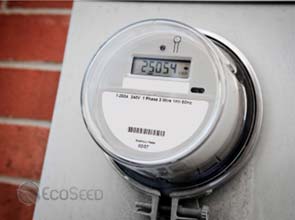The Swedish research firm said the figures represent a compound annual growth rate of 26.6 percent between 2010 and 2016. It is widely believed that demand for smart meters is growing because of the energy savings brought by involving consumers to wisely manage their consumption.
Penetration rate, a measure of product popularity, of smart meters was found to be highest in Asia-Pacific from around 15 to 25 percent today globally to 75 percent by 2016. Europe and North America follows closely at 50 percent penetration.
To date, Berg Insight ranks Europe and North America as the leading adopters of smart metering technology. But the research firm said that the Asia-Pacific region, and in particular China, will be quick to emerge on top of current leaders with more aggressive strategies to boost adoption.
Both western continents were among the pioneers of having smart meters as an integral part of an advanced, more efficient power grid, with penetration rates expected to reach 100 percent by 2020. However, the sheer number of smart meters China want to install by 2015 could take nearly 10 percent of Berg Insight’s predictions one year early.
Part of China’s comprehensive 12th five-year plan adopted last March included deploying up to 60 million smart meters in an effort to make a nationwide smart grid system. Part of the reason behind this, according to consultancy firm APCO Worldwide, was the country’s outdated power grid incapable of supporting newer and cleaner sources of energy. APCO said that 30 percent of China’s wind farms were not connected to the grid last 2009.
South Korea also has plans for a nationwide smart grid network to be implemented by the national utility KEPCO. Smart meters will also be used in Japan as it struggles to recuperate lost energy transmission and generation assets after a magnitude 9 earthquake hit the country in March.
«Securing a sustainable supply of energy will be one of the greatest challenges for mankind in the 21st century», said Tobias Ryberg, senior analyst for Berg Insight and author of the report.
«Smart grid technologies will make a major contribution to achieving this goal by improving the efficiency at all levels of the electricity supply chain from generation to transmission, distribution, and consumption,» he added.
The current leaders
The push behind Europe’s smart meter market primarily comes from a federal mandate adopted in 2009 requiring bloc members to introduce a smart meter system by 2022. Around 80 percent of the regions is expected to have smart meters by 2020.
All member states are required to perform a cost-benefit analysis of smart metering before September 2012.
A separate report from Berg Insight predicts that such strategies could help bring installation numbers to reach 130.5 million by 2016, with annual investments amounting to exceed EUR 3 billion
Mr. Ryberg said the region’s growth will be concentrated in Spain, France, and Britain.
Edesa, the largest electric utility in Spain is planning to rollout smart meters to 12.9 million customers. Second largest electricity network operator Iberdrola will also follow the lead, according to Mr. Ryberg.
The French government announced last month it will also fit 35 million homes across the country with smart meters by 2018 through the «Linky» smart metering project led by Electricit’e R’eseau Distribution France, the largest distribution system operator in the country.
Elsewhere in the region, Energy suppliers British Gas and E.ON AG have committed to deploy several million smart meters by 2014, according to Mr. Ryberg.
Meanwhile, growth in the United States is caused by combination of stringent mandates from states, like California and Texas, and funds from the federal stimulus package. According to Berg Insight, North America will have 87.4 million smart meters installed by 2016.
According to energy management software company eMeter, there are 16 jurisdictions with policies promoting smart meter use, namely California, Oregon, Nevada, Idaho, Arizona, Texas, Michigan, Maine, Pennsylvania, Delaware, Maryland, Alabama, Mississippi, Georgia, Florida, and the District of Columbia.
Nearly all households in Ontario have smart meters installed in early 2011. BC Hydro in British Columbia, Canada is also using smart meters from Itron Inc. to all its customers by the end of 2012. (Oliver M. Bayani)













